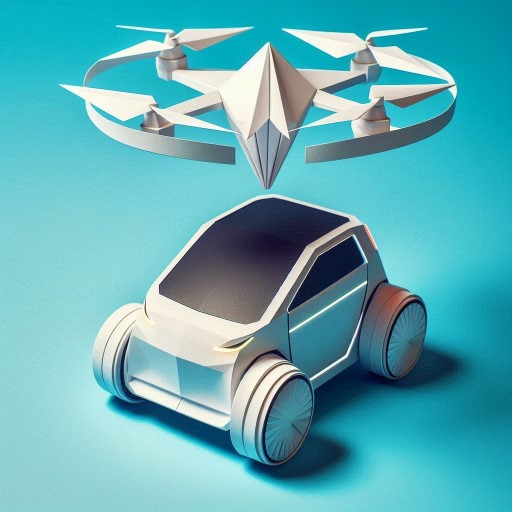TechTrend4u – Autonomous cars, or driverless vehicles, are one of the most exciting technological innovations in the automotive world today. These cars are designed to drive themselves without human intervention, with the help of artificial intelligence (AI), sensors, radars, and cameras. In this article, we will discuss what autonomous cars are, how they work, their benefits, challenges faced, as well as some examples of their implementation in the real world.

What is an Autonomous Car?
An autonomous car is a vehicle that is capable of driving itself without the need for human control. This technology relies on a combination of sensors, cameras, radar, and advanced AI systems to monitor the surrounding environment, make decisions, and drive the vehicle. Autonomous car have the ability to detect nearby objects, recognize traffic signs, navigate the road, and avoid obstacles safely.
How Autonomous Cars Work
Sensors and Cameras
Autonomous car are equipped with various sensors and cameras that allow the vehicle to “see” the surrounding environment. LIDAR (Light Detection and Ranging) sensors, for example, use laser beams to map the environment with great accuracy. In addition, cameras on autonomous car are also used to recognize traffic signs, road markings, and other objects on the road.
Radar and Ultrasonic
Radar in autonomous car serves to detect objects around the vehicle, such as other vehicles, pedestrians, and obstacles. Ultrasonic technology is used to detect closer objects, for example when parking or avoiding collisions.
Artificial Intelligence (AI)
Artificial intelligence (AI) is the brain of an autonomous car. AI uses data collected from sensors and cameras to understand the surrounding environment, make decisions, and drive the vehicle. For example, AI can decide when to stop, accelerate, or change lanes based on the information received. AI also continuously learns from experiences on the road, so the driving ability of autonomous cars can improve over time.
Read more: Artificial Intelligence: The Next Industrial Revolution?
Benefits of Autonomous Cars
Reduced Traffic Accidents
One of the biggest advantages of autonomous cars is their potential to reduce traffic accidents. Most road accidents are caused by human error, such as being sleepy, distracted, or drunk. By removing the human factor from the driving process, autonomous car can reduce the number of accidents and improve road safety.
Improving Traffic Efficiency
Autonomous cars can communicate with each other and with road infrastructure to optimize traffic flow. With the ability to move more precisely and coordinated, autonomous car can reduce congestion, save fuel, and speed up travel time.
Improving Accessibility
Autonomous cars can also provide greater accessibility for people who cannot drive, such as the elderly, people with disabilities, or children. With autonomous car, they can travel more easily and independently without having to rely on others.
Read more: Electric Vehicles: A Greener Future for Transportation
Challenges and Obstacles in Autonomous Car Development
1. Safety and Reliability
While autonomous cars have the potential to improve road safety, there are major challenges in ensuring that this technology is truly safe and reliable under various conditions. The development of AI algorithms capable of handling complex road situations, bad weather, and unpredictable scenarios remains a major challenge.
2. Regulation and Law
Legal and regulatory aspects are also a major challenge in the adoption of autonomous cars. Many countries are still formulating the right regulations to govern the use of autonomous car on the road. The question of who is liable in accidents involving autonomous car, as well as how to integrate these vehicles with conventional traffic, is still being debated.
3. Public Acceptance
Although autonomous car technology continues to evolve, public acceptance of driverless vehicles still varies. Many people still feel uncomfortable with the idea of self-driving cars, especially in terms of safety. Therefore, education and safe and transparent trials are needed to increase public confidence in this technology.
Autonomous Car Implementation Example
Waymo
Tesla
Tesla, under the leadership of Elon Musk, has incorporated autonomous technology in its cars through its Autopilot and Full Self-Driving (FSD) systems. Although Tesla still requires a driver to monitor the vehicle when these systems are active, this technology is an important step towards fully autonomous vehicles.
Uber
Uber has also been testing autonomous cars for ride-sharing services. Although Uber has faced challenges and adverse incidents in the development of this technology, they remain committed to making autonomous car part of their vision of the future of transportation.
Read more: Ride-Sharing: Transforming Travel in the Sharing Economy
The Future of Autonomous Cars
The future of autonomous cars is promising, but also challenging. With ever-evolving technological advancements, autonomous car have the potential to become an integral part of transportation in the future, changing the way we travel and improving road safety. However, achieving this vision will require collaboration between industry, government, and society to overcome the technical, regulatory, and social challenges that exist.
Read more: Smart Public Transportation: More Efficient and Convenient
Conclusion
Autonomous cars are one of the biggest innovations in the automotive world and have great potential to revolutionize transportation. By reducing human error, improving traffic efficiency, and providing greater accessibility, autonomous car can bring many benefits to society. While challenges remain, with the right approach, autonomous cars could be the key to a safer, more efficient, and inclusive transportation future.



